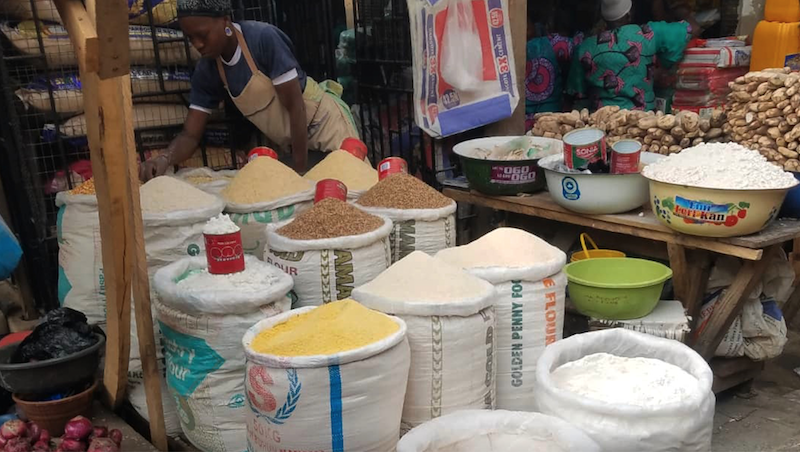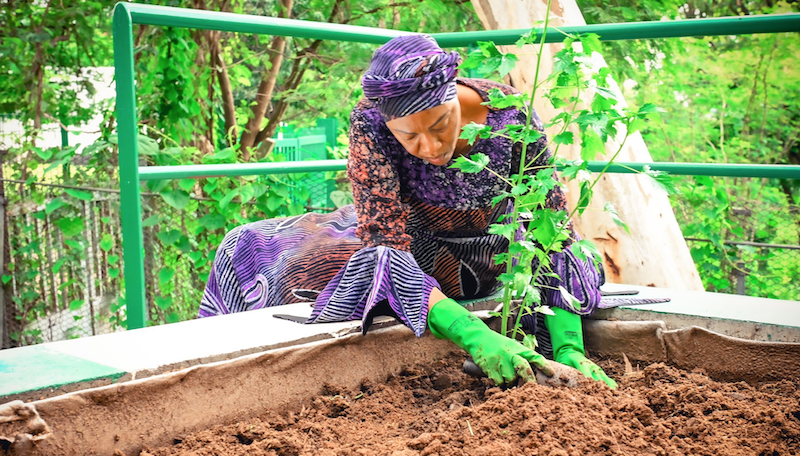In tune with the extant global trends, Nigeria is experiencing an unprecedented increase in the cost of basic food items. Findings in Kaduna, Kano and Katsina States have shown that Nigeria was not an exception.
For instance, a check conducted in Kaduna revealed that the surge was particularly notable in the prices of rice, bread, sugar, garri, beef and eggs, amongst others, which are staples in most homes.
Also, the rising cost has had an impact in the living standard of the residents as the majority of the homes now find it formidably challenging to afford three square meals.
It was also gathered from the Abubakar Gumi Central market and other markets within Kaduna city that the price of Mama Gold rice had risen to about N75,500 per bag, while a 50kg Stallion, Optimum brands now sell from N77,000 to N80,000.
Also, a loaf of bread was now being sold between N1,000 and N2,500 depending on the brand and quality.
A measure (mudu) of ‘white garri’ that used to sell for N400 was now sold for between N1200. while a measure of ‘yellow garri’ sold for N600 now goes for between N1300 and N1,500.
Similarly, a crate of egg that was selling for N3000 hitherto, now sells for between N4,000 and N4,500 depending on the size.
Also, a kilogram of meat (beef) formerly sold for N3,000 before was now being sold at N5,000.
Meanwhile, farmers in parts of the state have attributed the high costs of foodstuffs to the fuel subsidy removal.
Some of the farmers who spoke to NAN in separate interviews in Kafanchan blamed the hike in the prices of foodstuffs on the high cost of transportation, occasioned by the removal of fuel subsidy by the Federal Government.
Ishaya Chingali, a large-scale farmer, said inflation had also led to the high cost of farm inputs like fertilizers and herbicides.
“If they can take care of the cost of transportation, the high cost of food stuff will be addressed by 50 percent,” he stated.
On his part, Kure Kade, President, Organic Ginger Farmers Association, said the only way out was for the government to subsidize farm inputs.
He said Nigeria was capable of feeding itself without necessarily importing any food stuff.
In a related development, the Kaduna State Government said it had distributed farm inputs, farm implements as well as agro-processing equipment to 40,000 smallholder farmers to boost food production.
Murtala Dabo, the Commissioner, Ministry for Agriculture, made this known in an interview in Kaduna.
The items were distributed under the government’s ‘A Koma Gona’ (Back to Farm) initiative.
According to him, the programme targets beneficiaries in the 23 local government areas of the state.
He said the state was the largest producer of ginger, maize, as well as tomatoes in the country, lamenting that the farmers suffered post-harvest losses such as tomatoes and ginger.
Dabo assured that the state government would revisit the now stalled tomato processing plant in Ikara to address the losses suffered by tomato farmers in the area and other surrounding local governments.
He said, “Agriculture remains the backbone of the economy, providing employment and sustaining livelihoods. The state is blessed with huge agricultural potential
“Smallholder farmers and small-scale agro-processors have been facing difficulties due to the current economic challenges in the country.
”This category of farmers is very critical in our quest to ensure food security.
“It is for this reason that the government has come up with the ‘Tallafin Noma – A Koma Noma’ as part of our Sustainable Livelihoods through Social Interventions and Economic Empowerment Initiative.
“Under this “A Koma Gona” (Get Back to Farm) component, the Ministry for Agriculture was mandated to target a minimum of 40,000 smallholder farmers and farmers’ cooperatives across the 23 LGAs.”
According to Dabo, the ‘Tallafin Noma programme’ includes the distribution of inputs for crop and livestock production, crop production, improved maize seeds, agrochemicals, NPK and Urea fertilizers.
“For livestock production (poultry), 30 day-old chicks with four bags of feed and drugs are distributed, while 50 jumbo juveniles (catfish) with two bags of feed and drugs are distributed for fisheries.
“To boost micro-mechanisation of the agriculture sector in the state, power tillers and accessories were distributed to farmer cooperative groups.
“This is a crucial step towards increasing production and productivity in our farms,” he added.
The commissioner added that ‘Knapsack’ sprayers with Personal Protection Equipment (PPE) were also given to the farmers for agrochemical and liquid fertilizer application on their farms.
“For the agro-processors, vegetable grinders are distributed to individuals, while hammer mills, haulers and threshers are distributed to cooperative groups as group assets.
“These processing machines would add value to our agricultural produce and improve the livelihoods of individuals and groups involved in agro-processing activities,”Dabo said.
To reduce herder-farmer conflicts in the state, he said the state government has commenced the Livestock Development Project (L-PRES).
He said bringing the project to the state had also helped to tackle the frequent clashes between farmers and herdsmen.
Dabo said that the project would focus on the component of conflict management aimed at finding a lasting solution to the problem.
Meanwhile, a farmer in Kaduna State has appealed to the government at all levels to enhance agricultural mechanization.
He also urged them to replace the animal-drawn plough system for land preparation and other agricultural production processes to boost food security and wealth generation.
Malam Ahmed Abubakar, a member of the Albarka-Shika Farmers Cooperative Society, made the appeal in an interview in Zaria.
He said, “Farming is a business; the government at sub-national levels should woo and entice youths by providing simple labour saving devices in farming to strengthen production.
“These tools and devices are not affordable to many youths and small-scale farmers; we are in the 21st century,so, it is high time to do away with cutlasses and hoes and embrace full-scale mechanized agriculture.
“Bandits and other criminal elements would not allow the small -scale farmers to keep cattle for traditional plough.
“If the farmers have these machines at their homes, it will not be easily stolen like cattle,’’ he said.
Abubakar said the initial intervention by the Federal Government for wheat farmers under dry season farming had gladdened the hearts of the farmers across the state.
Abubakar said no fewer than 10,000 farmers received improved wheat seed varieties, herbicides and fertilizer and other inputs for cultivation of a one hectare field at 50 per cent discount.
He, however, said that the gesture had greatly increased the production of wheat in Kaduna State during the last season.
The farner added that the intervention, which assisted many peasant farmers in the state, had also rekindled their hope as the Federal Government was set to replicate the support to additional 40,000 maize and rice farmers.
He said the 40, 000 farmers who were registered by the Federal Government through the Kaduna State Agricultural Development Agency (KADA) for the dry season farming of rice and maize did not receive the inputs.
However, Abubakar said there were insinuations that the cohorts captured for dry season intervention would receive the inputs for wet season farming alongside other commodity growers; saying, ” this also has not been materialized.
“It is an established fact that the early distribution of inputs to farmers boosts production and increases wealth generation to farmers.
“The major problems are insecurity and high cost of inputs,’’ Abubakar said.
He lamented the delay in the distribution of the fertilizer donated by the Central Bank of Nigeria to the Federal Ministry of Agriculture and Food Security.
According to him, the delay in the distribution of the inputs by the government and high inflation rate in the country had increased the cost of fertilizer and other inputs, which have a “devastating effect on food security.”
While speaking on the policy of the Federal Government on the all-year round food production, Abubakar lamented, ” Beside the pronouncement, we are yet to see any tangible effort of the government on this.”
He added that dry season farming was done with water from the stream and dams.
Abubakar said, “But the available dams were not desilted, new ones were not created while modern equipment and other simple labour saving devices were also not put in place.”
Abubakar, therefore, urged the governments at sub-national level to increase efforts on providing improved quality seeds to the farmers, which is the bedrock of sustainable food production.
He said the Institute for Agricultural Research used to provide one of the cheapest high quality seeds to the farmers, decrying, ” Now the prices of such improved seeds have skyrocketed.
“In private seed companies, the cost of improved maize seed per hectare ranges between N64, 000 to N120, 000; hence the need for government’s intervention on this and other inputs.
“Government should enhance the reintroduced GES and totally abolish the anchor borrowers’ scheme,’’ he said.
Corroborating, Alhaji Nuhu Aminu, Chairman, All Farmers Association of Nigeria (AFAN) Kaduna State Chapter lamented that banditry and kidnapping were major impediments to food security in the state.
He said the recent abduction of Ashiru Sherehu, Village Head, Tunburku, Giwa LGA, Kaduna State at his farm on Saturday indicated the impact of worsening insecurity to agriculture and food security.
He said that sustainable agricultural growth and development can only be achieved in an environment that was secure and peaceful.
According to him, insecurity in northern parts of Kaduna has threatened food production in the state as most of the large-scale farmers have abandoned their farms in areas such as Birnin Gwari, Giwa, and Igabi LGAs.
“The few that sustain farming now scavenged on little small-scale farms around Soba, Kubau, Ikara , Makarfi and Kudan LGAs,”he added.
Aminu commended the Federal Government for subsidising inputs for dry season farming through the National Agricultural Growth Scheme and Agro Pocket (NAGS –AP) initiative.
He, however, urged the government to sustain and upscale the initiative to strengthen food security and job creation.
According to him, the NAGS-AP was one of the best government initiatives that target smallholder farmers, thereby improving food production.
Alhaji Nuhu Aminu, Chairman, All Farmers Association of Nigeria (AFAN)Kaduna State chapter, attributed the high cost of food items in the state to inadequate and late supply of farm inputs.
Aminu made the assertion during an interview with the News Agency of Nigeria (NAN) in Kaduna.
He explained that the farmers were not able to start farming early even with the rains due to the high cost of fertilizer and the late distribution of seedlings and pesticides among others.
“This led to poor yields causing the peasant farmers to sell their surplus produce to middlemen who now determine the prices in markets.
“But, with the Federal Government’s initiative to distribute farm inputs to the farmers this year using their mobile phones, we are hopeful that there will be bountiful harvests, ” he said.
Aminu said the Federal Government has commenced the distribution of farm inputs to the farmers in some local governments of the state, adding that more farmers would be captured in the programme.
Aminu explained that the items included fertilizer, pesticides and seedlings which would be given at subsidized prices to the farmers, with the Federal Government paying half the price of the items.
”This will help bring down the prices of food items, “he said.
In a bid to secure the farmers and the farms, the Police Command in Kaduna State Government has donated 100 motorcycles to it.
The command also said it has has p in place elaborate plans to secure farmlands for the farmers to farm without fearing any security threats.
The command’s Public Relations Officer, Mansir Hassan, told the News Agency of Nigeria (NAN), that the gesture by Gov. Uba Sani was aimed at further protecting farmers across the state.
According to Hassan, the motorcycles had since been distributed to the Divisional Police Officers in the affected areas where farmers are no longer apprehensive to go to the farms.
He said the essence was to make sure that the farmers were protected in their farmlands when farming in the insecurity-prone areas of the state.
Hassan said the plain-clothes security personnel and vigilance services were part of the plan.
He said that the initiative would boost the farmers’ morale to troop to the farms without harbouring any fear.
He said that the Commissioner of Police,Mr Ali Dabigi, has a lot of plans with the support of the state government, saying that they would yield positive results.
In Kano State, some agriculture experts have advised the Federal Government to engage in discussions with farm produce marketers and large-scale farmers to curb the soaring food prices in the country.
Some of the experts spoke with the News Agency of Nigeria(NAN) in Kano on measures to stem the tide of skyrocketing food prices and roof-top inflation.
Alhaji Nasiru Musa, the Managing Director of ANS farms limited, said that engaging legitimate farm-produce marketers and large-scale farmers was the simple and feasible solution to the soaring food prices.
According to him, it is very difficult to differentiate between foodstuff hoarders and large-scale farmers and legitimate farm-produce marketers who have large warehouses where they keep their commodities before distributing them to other parts of the country.
He advised the government at all levels to purchase the foodstuffs in large quantities directly from the large-scale farmers and resell them to the masses at affordable rates throughout all the local government areas.
“I appeal to the government also to discourage bulk purchases by individuals or groups, by doing this, the prices of food can be controlled to some extent and food will reach the poor,” he said.
Abubakar Sani, a retired director, state ministry of Agriculture, who also called on federal government to sit with large-scale farmers particularly in the North, said that farm products were being exported to neighbouring African countries due to the weak value of the Naira
He further urged federal and state governments to support farmers with solar-powered pumps, fertilisers, seeds, extension services, pesticides, among others.
Mahmud Garba, a lecturer, explained that rising cost of living and escalating food prices have been the main challenge that the majority of Nigerians were battling with at the moment.
According to him, the rise in the cost of staple food and other products has affected the purchasing power of many Nigerians, as it is now very difficult for the majority of households to afford daily meals.
Sanusi Bature, Director General Media to the Kano State Governor, said that the state governor had approved the procurement of fertiliser, valued at over N5bn, to show the state’s commitment to food sufficiency, through agricultural transformation.
He said that the move was in fulfilment of Yusuf’s campaign promise to support smallholder farmers, especially in rural areas, toward a high yield of crops in the 2024 rainy season.
“The fertiliser approved for purchase will complement those already produced by the state-owned Kano Agricultural Supply Company and would be made available to farmers at a subsidized price within the state.
“Governor Yusuf had previously purchased grains, worth billions of naira and distributed them to the vulnerable people in the state, to cushion the economic hardship faced by a significant number of people in the state,” he said.
On economy,Abdulfatah Adewale, a financial expert also advised the Federal Government to explore the reduction of taxes and duties and support the consumption of locally produced goods and services to address the economic challenges facing Nigerians.
He urged the federal government to come up with fiscal policies like tax reduction to encourage companies to invest, expand and employ more workers.
Adewale also Advised the government to equally reduce the duties paid by importers on some goods, give incentives to consumers of locally produced products and pump in money into the system.
In Katsina, a cross section of the residents of Katsina metropolis expressed concern over the continued hike in the prices of foodstuffs and other goods in the state.
Speaking to the News Agency of Nigeria (NAN) in Katsina, the residents said the hike in prices of foodstuffs, coupled with other economic hardship has pushed many people into poverty and hunger.
Malam Ibrahim Isma’il, a civil servant, said before the current hardship, his salary can sustain him to another salary, but now it can not provide his family with food for two-weeks.
A trader, Malam Bala Baba said, “To be honest with you, life is difficult for many of us, because business is no longer moving because of the economic hardship, and our businesses are collapsing.
During a visit to some of the markets in the city, NAN reports that the quantity of Maize (mudu) which was sold a few months ago at N1,200, is now N1,600.
The local rice sold at N3,600, is now N4,000, beans sold at N3,400 per measure, is now N4,800, while a measure of cereal sold at N1,600 is now N2,200.
Also at Chake market, a bag of Maize is sold at N89,500, cereal at N86,000, millet N88,000, beans N165,000, Suyer beans N89,500, while a bag of local rice is N58,000.
Although some of the residents attributed the hardship to the current economic situation in the state, some said the insecurity also is contributing.
Recall that recently, the Katsina State government in an effort to boost the agricultural sector, recruited 722 extension workers and provided them with motorcycles and other equipment.
During the event, Gov. Dikko Radda said, “Second way of fighting poverty is to improve productivity. Agriculture is our major occupation, that’s why we created Katsina State Irrigation authority.
“The aim is to have all year-round irrigation farming in the state, that will reduce redundancy, and keep everybody busy.
He pointed out that to achieve or increase productivity , farmers have to be sensitised on farming as a business.
According to the governor, when he came to power, there were only 72 extension workers in the state.
“We gave each of them a motorcycle and other equipment to enable them move around to enlighten farmers on the way to improve their productivity.
“We also launched the sales of about 20,000 metric tons of fertilizer to farmers in the state at a very subsidised price.
“These are some of the things that we are putting in place to engage the farmers, the youths and the locals to be more productive, reduce the level of poverty and improve their livelihood.”
The governor also revealed that the state government, through the KT-CARES, has supported over 6,100 farmers in the state.
Recently, the state government in collaboration with an NGO, Mercy Corps embarked on herder-farmer conflict resolution, especially across some front-line areas.
The dialogue, organised through the Conflict Mitigation and Community Reconciliation in North-West Nigeria (CMCR-NW) project.
was aimed at promoting locally-driven peace initiatives through interest-based negotiation.
Speaking at the event, the state’s Commissioner for Agriculture and Livestock Development, Prof. Ahmed Bakori, said the dialogue was a necessary sequel to the prevalence of such conflicts during the rainy season.
“This situation poses a challenge to safe farming and grazing activities, and affects agricultural activities leading to minimal harvests and overall output.
“It then becomes imperative for stakeholders to brainstorm and design appropriate strategies to prevent and where possible mitigate tensions during the forthcoming farming season.
“With this development, farming activities across the front line areas will hold for this rainy season,” Bakori assured.





